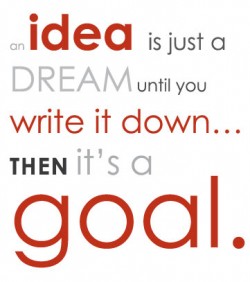
Why?
Setting goals is crucial to success. The basic reason is that you can’t get to where you’re going, unless you know where that place is. Imagine you get in your car and just start driving. Who knows where you’ll end up! Goals are something that we have in place to help keep us focused. They give us a direction, a purpose for our behaviour, and something tangible that we can keep in our minds to help stay motivated. The most successful athletes set goals, you should too!
Big goals and small goals
If you are trying to achieve something big and challenging, like changing your lifestyle to be more active, or losing a large amount of weight, or going from the couch to running a marathon, then it’s important to set yourself several smaller goals on the way to your bigger goal. Like if you were planning a drive from Melbourne to Brisbane. Rather than just map out one big, long drive, you’d be better off to break it down into smaller, achievable daily drives, and have your overnight stops mapped out and booked in, to look forward to at the end of each day – knowing that each stop has you that much closer to your destination.
Make it about YOU
The most successful motivation comes from within – intrinsic motivation. The reason for exercising needs to be something that YOU truly want and that will make you happy, not something your partner, friends, parents or doctor has told you to do. Make sure you look inside yourself for what it is you really want to achieve. Will it really drive you for the long term?
SMART goals
When you are setting yourself a goal, the acronym SMART can help you to make sure your goal is a good one.
- Specific
- Measurable
- Achievable
- Reaslistic
- Time bound
Specific and measurable
Making your goal specific is very important, because if your goal is too vague, you won’t know when you’ve achieved it. Having a goal that is measurable is just as important, because if you can’t measure it, then it’s not something that you can actually track your progress on.
Saying something like ‘I want to get fit’ or ‘I want to be healthy’ is a great starting point, but what does ‘fit’ or ‘healthy’ even mean? It means something different to every person, so you need to define EXACTLY what it means to you. Do you want to be able to do 10 pushups? Run 5km? Walk up the stairs without being breathless? Get off your blood pressure medication? Even ‘I want to lose weight’ is still too vague. You need to know HOW much weight you want to lose in order to see if you have reached your goal!
Achievable and Realistic
I
Expecting to go from the couch to running a marathon in a month is a bit unrealistic, while wanting to run 100m in a month might be a bit too easy. Maybe start with a 5km and work your way up from there.
Losing too much weight too fast is generally not healthy and not long-lasting. A healthy weight loss plan will be around 0.5- 1kg per week, and if you’re gaining muscle, maybe even less than that! Rather than just the number on the scale, looking at your clothing size or your performance can be a better indicator of success in the long run.
Time bound
The final step in setting successful goals is they have to have a time frame on them. Having a time line gives you a sense of urgency, and keeps you focussed and accountable. Saying ‘I want to run a 10km race in the future’ is much less effective than saying ‘I want to run the 10km race at the Gold Coast Marathon in July.’ Why? Because without a specific time in mind, the future could be 6 months or 6 years away, and sooner is generally better when it comes to achieving goals!

